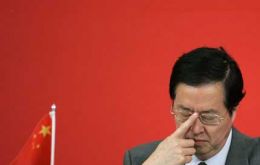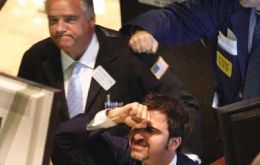MercoPress. South Atlantic News Agency
Economy
-
Tuesday, August 14th 2007 - 21:00 UTC
Markets begin positive reaction to massive liquidity injection

Central banks in the world's leading economies pumped extra money into the financial system for a third straight trading day on Monday helping to soothe markets and scare the dangers of a credit crunch.
-
Monday, August 13th 2007 - 21:00 UTC
Continued cold weather thumps Chile's fresh fruit deal

Continued frigid artic weather in Chile's key agricultural growing areas will cost the country at least US$200 million in loses, according the industry and government leaders. An estimated 85,000 sheep, cattle, pigs and goats have died for lack of food, and key fruit export crops, including avocados and citrus fruit, have been greatly damaged.
-
Monday, August 13th 2007 - 21:00 UTC
China missing inflation target could hike interest rates

Inflation in China, the world's fastest-growing major economy, accelerated to its highest level in more than 10 years, fuelling speculation that the Government may raise interest rates for the fourth time this year.
-
Monday, August 13th 2007 - 21:00 UTC
US escalates trade dispute against China at WTO

United States asked the World Trade Organization to rule in a complaint against China over piracy of copyrighted movies, music, software and books, escalating a dispute that has soured commercial relations between the two trading giants.
-
Saturday, August 11th 2007 - 21:00 UTC
Massive coordinated liquidity injection to sooth markets

The United States Federal Reserve pumped 38 billion dollars into the banking system Friday, marking its biggest operation since the week of the 9/11 terror attacks, as it vied to shore up the US financial system.
-
Saturday, August 11th 2007 - 21:00 UTC
Falklands have highest internet connections percentage in the region

The Falkland Islands, considered as part of the South American continent, have the highest percentage of population internet connection, 69%, followed by Chile, 42%, Argentina 34% and Uruguay 33.6% according to the latest release from Internet World Stats.
-
Friday, August 10th 2007 - 21:00 UTC
US markets plunge and more volatility forecasted

United States stocks plunged Thursday with the Dow Jones falling to its second worst close so far this year, as reports of liquidating hedge funds triggered more credit-related anxiety
-
Thursday, August 9th 2007 - 21:00 UTC
Santiago covered in snow and Chilean farms knock out

Chile's capital Santiago woke up Thursday to a very unusual sight: most of the city was covered by ten to fifteen centimeters of snow, becoming thicker towards the east and the mighty Andes cordillera.
-
Thursday, August 9th 2007 - 21:00 UTC
Central banks inject funds to contain fears of global credit crunch

The European Central Bank, ECB, pumped 94.8 billion Euros into the Euro zone banking market Thursday in an attempt to contain fears about a sub-prime credit crunch spilling over from United States.
-
Thursday, August 9th 2007 - 21:00 UTC
Yuan clash: China threatens with massive sale of US bonds
The Chinese government has begun a concerted campaign of economic threats against the United States, hinting that it may liquidate its vast holding of US treasury bonds if Washington imposes trade sanctions to force a Yuan revaluation.
